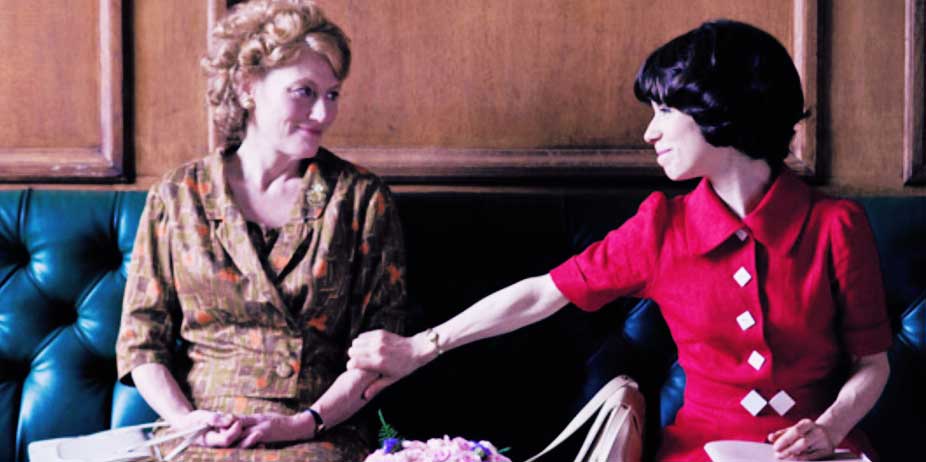
Made in Dagenham (2010)
Based on a true story, this film attempts to recreate the trials and upward hill battle that faced working women in England in the 1960's.
It's not particularly fun to be a woman working in a factory, particularly for the Ford Motor Company in Dagenham, a small British town. During an era when beehive hairdos are in and hot pants are just starting to appear in fashion magazines, the women who sew the leather seats for automobiles are looking for a pay raise, or at least to have wages equal to those of their husbands for doing the same basic labor. Albert (Bob Hoskins) is their contact at the Union and tells them that he is organizing a strike threat -- and he wants two of them to accompany him and his associate to meet with the Ford offices. Rita (Sally Hawkins) is awarded the task and along with her friend Connie (Geraldine James), travels into town thinking she will be able to offer her two cents. But as it turns out, the Union doesn't want her two cents -- and aren't about to let her speak it until she takes the initiative to tell Ford's lawyers just what she thinks of the company's chauvinistic tendencies.
Suddenly, Rita is the voice of the women who work at the factory and this time she intends to take them on a real strike to prove it is not an empty threat. Her political statement resounds with the public and engages them in a battle for the right to earn a proper wage -- eventually earning her the respect of one of the opposing council's wives (Rosamund Pike) and gaining her the attention of the Secretary of State (Miranda Richardson). But fighting for her rights may threaten the delicate balance of her family life, particularly when her husband is left taking care of the kids.
This movie should have worked and for a lot of people it did. I am not one of them. I am not sure what failed to resonate with me but in spite of it being a good film on a topic that I find interesting I was a bit bored throughout. That is not to say the cast is to blame, because everyone is at the top of their game here -- although admittedly, Richardson steals the show. I must conclude therefore that it lacked passion in spite of the series of thematic events that unfolded in it. Hawkins is a decent actress but doesn't have much screen chemistry. And between the content, which neither flattered the script nor was necessary to the overall plot, and the lack of much character development outside one or two people I wasn't as impressed as I wanted to be. Politics does enter into the story to an extent -- this incident revolves around a time when Labour was in power, and some of the sexism on display is truly appalling. But the ending is triumphant and the atmosphere (costumes, set design, and so forth) are terrific. It's an example of fine work that can be done on a limited budget.
Shame about the bad language and sexual content, though -- about twenty f-words pollute the dialogue, along with three abuses of Jesus' name. There is one sex scene early on in the back of a car (we see movement; the girl appears to be bored and comments on the poor stitching job done on the backseat -- both are clothed). The women frequently undress in the workroom down to their bras, since it is usually stuffy -- on occasion men wander through and are humiliated. Mild innuendo intrudes as a girl taunts a young man; she wears revealing clothing on several occasions. A sign the girls have painted is accidentally arranged so the last half of the message is obscured; massing motorists read it as "we want sex" and honk at them. We learn that a man is deeply depressed after having suffered in the war; he awakens from a nightmare and attacks his wife, shoving her against a door before realizing he's no longer dreaming. A man hangs himself (we do not see the action, only his feet swinging in the camera frame when he is discovered).
Though I did not have high expectations for this film I did not feel it quite lived up to its full potential. It's important to remember the individual struggles for equality within our society between people on all sides, to remember how it was as well as share in the successes that changed our society, often for the better. Maybe it wasn't quite good enough. Or maybe I was just not in the mood for it that evening.
